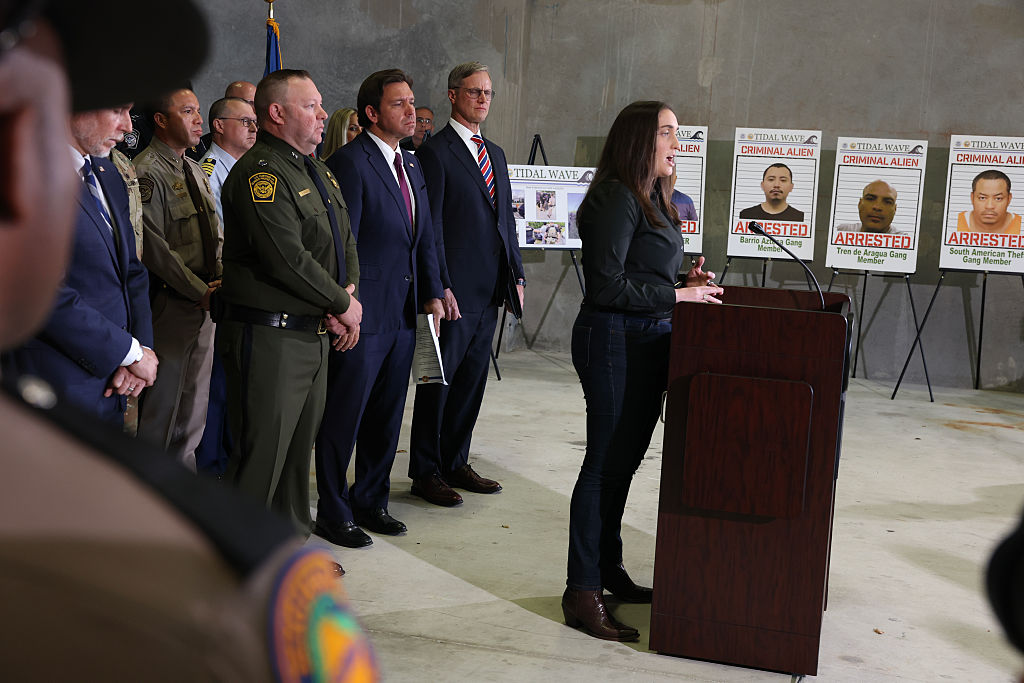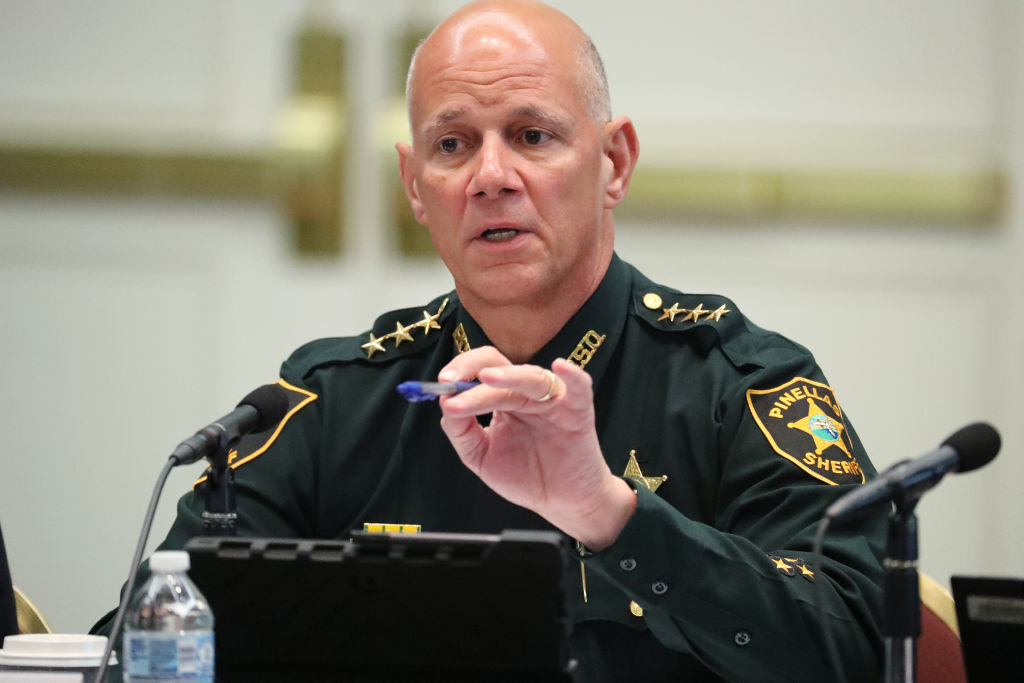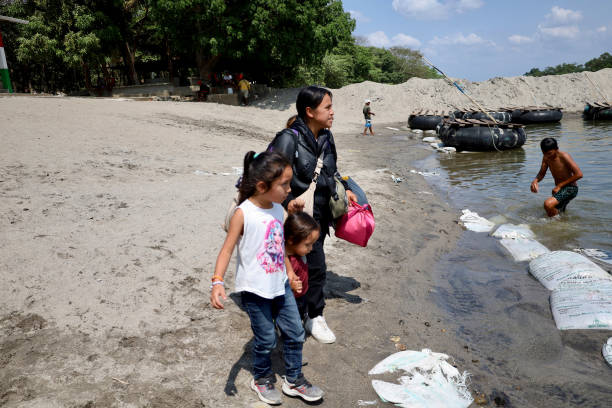These School Cops in Florida Ordered to Help ICE Arrest Immigrants, Records Show
Pinellas County Schools said plans to deputize cops as ICE agents was a mistake, but records obtained by The 74 show how deep their cooperation went.

Get stories like this delivered straight to your inbox. Sign up for The 74 Newsletter
School police in St Petersburg, Florida, have been instructed to assist President Donald Trump’s immigration crackdown, records obtained by The 74 show, even as leaders say an effort to secure federal arrest authorities for campus officers was a simple mistake by the district’s top cop.
Pinellas County Schools Superintendent Kevin Hendrick was looped in on a Feb. 24 directive from his police chief ordering campus officers to detain and question anybody they encounter with a federal deportation order and to alert U.S. Immigration and Customs Enforcement, according to emails and other documents obtained through a public records request. Hendrick was also notified by district police Chief Luke Williams of plans to deputize school-based officers under a federal program that grants immigration arrest authority to local law enforcement agencies and that’s experienced rapid growth since the beginning of Trump’s second term — in large part from new partnerships in Florida.
Immigrant rights groups and privacy advocates have for years warned that school-based police officers could share information about undocumented students and their families with federal immigration officials and that the program to deputize local cops, known as 287(g), could give immigration agents a foothold in schools.

The revelations in Pinellas County, advocates said, offer clear evidence of collaboration on immigration matters between the law enforcement division of the country’s 28th-largest school district and outside police agencies. The instructions given to school resource officers, they assert, could violate constitutional protections against unreasonable detention and children’s legal right to a free public education regardless of their immigration status.
“It should alarm and enrage every parent, teacher, and taxpayer in Florida that school police are being pressured to become informants for ICE and unconstitutionally detain members of our school community,” attorney Alana Greer, the director and co-founder of the Miami-based Community Justice Project, told The 74.
Greer noted the school district police department’s directive to assist ICE, and its 287(g) application, were voluntary decisions that undermine community trust and its mission to promote campus safety. “We don’t need or want armed cops in our schools doing ICE’s bidding. These efforts do nothing to keep our kids safe.”
The Florida Phoenix reported in March that the Pinellas County school district had applied to take part in 287(g), the nation’s first K-12 school district to take that step. In response to the resulting public outcry, Hendrick, the superintendent, said the district police chief acted in error and without his or the school board’s approval. The district didn’t respond to questions last week from The 74 about emails Hendrick and other district leaders received from Williams outlining the police chief’s intention to participate.

Records show the school district’s lawyers had planned to meet to discuss the 287(g) application before it became public and Isabel Mascaranes, the district spokesperson, was listed on the form as the point of contact for ICE “to coordinate any release of information to the media” regarding immigration enforcement actions. Asked by The 74 what knowledge she had of the 287(g) application before it was submitted to ICE, Mascaranes responded, “Can I get back to you on that?”
In a follow-up email, Mascaranes didn’t elaborate on when she first learned of the agreement, simply noting that she routinely handles “all media requests and releases.” She acknowledged the district police chief “maintains ongoing communication” with the sheriff’s office and other local law enforcement agencies and his decision to submit the 287(g) application was “guided by state and federal directives, intending to remain fully compliant with the law.”
Sign-up for the School (in)Security newsletter.
Get the most critical news and information about students' rights, safety and well-being delivered straight to your inbox.
ICE and the Florida governor’s office didn’t respond to requests for comment. The Pinellas County Sheriff’s Office also declined an interview request.
Voicemail records obtained by The 74 show it was ICE — not the district — that withdrew Pinellas school police from 287(g) consideration.
“ICE will not be entering into an agreement” with the district, Melanie White, an ICE deportation officer, said in a voicemail to Williams, adding that the immigration enforcement agency “will not extend the program in that way” to include K-12 school district police departments “at this time.”

‘An absolute priority of the Governor’
Perhaps nowhere more than Florida, home to an estimated 772,000 undocumented residents, has Trump’s immigration agenda been so forcefully embraced, with state and local officials looking for ways to bolster ICE enforcement. That includes Pinellas County Sheriff Bob Gualtieri, who was tapped by Gov. Ron DeSantis to lead a new State Immigration Enforcement Council. The council was tasked with carrying out a state law extending immigration enforcement far into the realm of state and local police.
Records obtained by The 74 show Gualtieri threatened Williams and others to get on board or face the governor’s wrath.
While “immigration stuff is confusing,” Gualtieri said in a Feb. 25 email to Williams and the heads of other Pinellas County law enforcement agencies, “it is also at the forefront of Florida politics and an absolute priority of the Governor.”
“The new law puts legal obligations on all of us to ensure we do certain things and the consequences for not doing so include removal from office by the Governor, including his power to remove police chiefs, city managers, mayors and commission/council members,” he continued, adding that he would hold a call to “on how to best comply with the new Florida law.”

DeSantis, who claims he’s created the national “blueprint” for mass deportations, signed the law in February that establishes prison sentences for undocumented immigrants who cross into Florida after illegally entering the U.S. and requires jails and sheriff’s offices in the state’s 67 counties to participate in the 287(g) program and facilitate arrests. A Miami judge ordered police agencies to stop enforcing the state law in April, saying it likely violates the Constitution’s Supremacy Clause and “unlawfully encroaches” on the federal government’s authority to enforce federal immigration laws. DeSantis and the Florida state attorney general are challenging the judge’s authority.
Florida lawmakers failed to pass a stricter bill this year which would have required all law enforcement agencies with at least 25 officers to form ICE partnerships. That law would have required Pinellas County school district police and other law enforcement agencies outside of sheriff’s and corrections departments to join forces with ICE. Even though that more far-reaching mandate did not pass, dozens of Florida law enforcement agencies voluntarily formed federal immigration enforcement partnerships, including the police departments at 15 colleges and universities.
Pinellas County Schools Police Chief Luke Williams signed the 287(g) agreement with Immigration and Customs Enforcement under pressure from the county sheriff, public records obtained by The 74 show. (Source: Pinellas County Schools)
And even though the Pinellas school police were not legally required by the law that did pass to pursue 287(g) or to act in concert with ICE when coming into contact with someone with a deportation warrant, Williams, the police chief, told the superintendent, the school board’s attorney and other districts leaders that they were.
Gualtieri “gave instructions on how deputies and officers should respond to the new law with respect to immigration and immigration enforcement,” Williams wrote in a March 5 email outlining his decision to submit the 287(g) application. “As you know we are bound to follow the law and during the conversation we were all advised that the expectation is that we do so.”
In that same email, Williams said he related Gualtieri’s directions about filing the 287(g) form to school board attorney David Koperski and “and we both agree we must follow the law.” The chief filed the form on Feb. 26.
Even without 287(g) arrest authorities, Williams told the superintendent that school-based officers would follow procedures outlined by Gualtieri to question and detain for up to an hour anyone they encounter with a federal arrest deportation order but who was not otherwise wanted on a criminal charge.

Gualtieri’s Feb. 24 order came after ICE added some 700,000 people with federal deportation orders to the massive National Crime Information Center, a centralized database that law enforcement agencies nationwide use to track and act on criminal warrants. Without 287(g) powers, the sheriff wrote, local officials lacked authority to arrest people with deportation orders alone. Instead, local officers should contact the local ICE office “to have someone respond to the scene.”
More than 1.4 million people nationwide have pending deportation orders — a third of whom live in Texas or Florida and include longtime residents, people without criminal records and those with U.S.-born spouses and children. A heightened focus on people with final deportation orders regardless of their criminal histories is part of the Trump administration’s broader immigration crackdown.
“If an ICE officer cannot arrive at the scene within one hour, then collect as much information from the person as you can and release the person and ICE will have to try to find them through their fugitive operations,” Gualtieri said. After forwarding the message to school-based officers, Williams told the superintendent that “Schools Police will do the same.”
Schools have for decades been considered a safe haven for undocumented students and their families after the 1982 Plyler v. Doe Supreme Court decision enshrined childrens’ access to public schools regardless of their immigration status — a right Trump-aligned conservatives in several states are now actively trying to undo.
On the second day of Trump’s second term, the president scrapped a longstanding policy that instructed immigration agents to avoid making arrests at schools and other “sensitive locations.”
Trump border czar Tom Homan defended the policy shift in February, claiming Central and South American gang activity in the nation’s schools required there be “no safe haven for public safety threats and national security threats.”
“People say ‘Well, will you really go into a high school?” Homan said in an interview with CNN. “Well, people need to look at the MS-13 members and Tren de Aragua members who enter this country, a majority of them between the ages of 15 and 17. Many are attending our schools and they’re selling drugs in the schools and they’re doing strong-armed robberies of other students.”

On the same day that the Pinellas schools 287(g) application became public, Chief Williams wrote that he had no desire to ferret out the immigration status of students and families, despite his stated intention to facilitate ICE arrests.
“I do not know the status of any of our students, or parents and do not care to,” Williams said in his March 5 email to Hendrick. “I do not want to place yourself or the School Board under scrutiny because I followed my beliefs but failed to follow the law.”
‘A new chilling dimension’
A week after Trump’s inauguration, school district lawyers released a memo dispelling social media posts claiming immigration agents had visited a Pinellas high school and outlined how school principals should respond if they were to show up in the future.
Certain educational records should not be released to federal officials without a subpoena, the memo noted, but ICE agents were in their authority to “bring a student to the front office for an interview” and make arrests. “We recommend cooperating” with ICE’s requests, the memo advises, and educators “should make an effort to contact the student’s parents before the school makes the student available to the Agent, unless the Agent directs the staff otherwise.”
Other districts have adopted starkly different policies. In April, the Department of Homeland Security said agents visited two Los Angeles elementary schools to conduct wellness checks on unaccompanied minor children who arrived at the border without their parents. Superintendent Alberto Carvalho told NPR the officials were denied entry onto the campuses and that school principals followed “a fairly rigid set of protocols specific to these types of actions.”
Renata Bozzetto, the deputy director of the nonprofit Florida Immigrant Coalition which filed the lawsuit against the state immigration law, said the communications between the school district police chief and the county sheriff were “absolutely horrible” and could deter children from enrolling. She said she was particularly alarmed to learn that school district law enforcement officials had access to data about people with deportation orders and questioned to what degree “parents are being run through the system.”
Federal law restricts the types of student information that public school districts can share with third parties. However, records created for law enforcement purposes, like logs of campus crimes, lack similar privacy protections.
School districts have for decades been navigating how much information they should share about students with law enforcement “but adding ICE to the mix is a new chilling dimension to that relationship,” said Cody Venzke, a senior policy counsel at the American Civil Liberties Union focused on surveillance, privacy and technology.
That Williams acted on the 287(g) application without formal approval from the superintendent or school board, Venzke said, highlights a lack of district control over its police department to ensure a “student’s right to an education is protected.” The directive to detain anyone with an administrative deportation order absent evidence of a crime, he said, “raises significant equity and constitutional concerns.”
If school-based officers are “roaming school hallways looking for students that have administrative warrants out against them,” Venzke said, “that is not an educational atmosphere in which students can feel safe and can learn.”
Get stories like these delivered straight to your inbox. Sign up for The 74 Newsletter

;)
